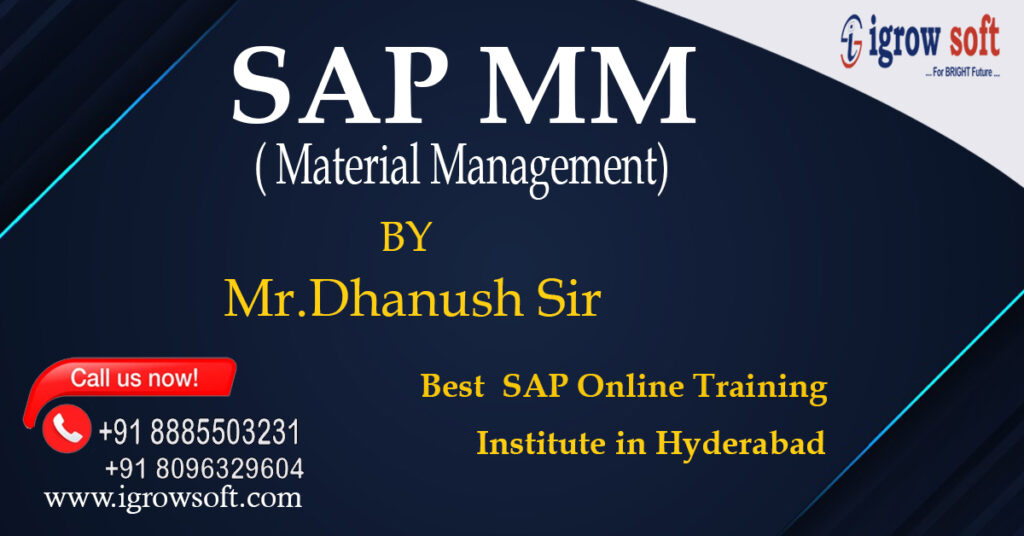
What is SAP MM?
One of the functional components of the SAP ERP (Enterprise Resource Planning) system is SAP MM, or SAP Materials Management. Organizations’ inventory and procurement processes are managed using SAP MM. It is essential to the materials management and supply chain procedures. Here are a few crucial SAP MM features:
- Procurement: The entire procurement process—from requisitioning to purchasing—is facilitated by SAP MM Module. It contains features for drafting purchase orders, buy requisitions, and controlling the acquisition of goods and services.
- Inventory Management: Organizations may effectively manage their inventory with the help of this module. This covers tasks like stock transfers, goods receipt, goods issue, and physical inventory management. It offers real-time visibility into the movements and levels of stock.
- Material Master Data: SAP MM maintains a central repository of material master data. This data includes information about materials such as description, unit of measure, storage locations, and other relevant details. Having accurate and up-to-date material master data is essential for effective materials management.
- Vendor Management: SAP MM supports vendor management by allowing organizations to create and manage vendor master data. This includes information about suppliers, terms of payment, and other relevant details. The module also handles processes such as invoice verification.
- Integration with Other Modules: SAP MM is closely integrated with other SAP modules, such as SAP SD (Sales and Distribution) for seamless coordination between procurement and sales, and SAP PP (Production Planning) for integration with production processes. This integration ensures a holistic approach to enterprise resource planning.
- Source Determination: SAP MM helps determine the best source of supply for materials by considering factors such as pricing, lead times, and vendor performance. This ensures that organizations can make informed decisions about where to procure materials.
- Workflow and Approval Processes: The module supports workflow and approval processes related to procurement. This includes approvals for purchase requisitions and purchase orders, helping organizations enforce their procurement policies.
- Reporting and Analytics: SAP MM provides reporting and analytics tools that allow organizations to analyze data related to materials management. This helps in making informed decisions, optimizing inventory levels, and improving overall efficiency.
SAP MM is widely used across industries and is especially prevalent in sectors where effective materials management and procurement are critical, such as manufacturing, retail, and pharmaceuticals. Professionals with expertise in SAP MM often find opportunities in roles related to procurement, materials management, and supply chain management within organizations that use SAP ERP systems.
The extent of learning SAP MM for somebody with a non-IT foundation:
Learning SAP MM (Material Management) can be a valuable endeavor for someone with a non-IT background, especially if they are interested in entering the field of supply chain management, procurement, or logistics. SAP MM is a module within the SAP ERP (Enterprise Resource Planning) system that focuses on managing materials and resources within an organization. Here are some aspects of the scope of learning SAP MM for someone with a non-IT background:
- Supply Chain Management: SAP MM is a key component in supply chain management. Learning SAP MM can provide insights into the end-to-end processes involved in the procurement, management, and utilization of materials within an organization.
- Procurement and Purchasing: SAP MM is widely used for procurement and purchasing activities. Understanding SAP MM allows individuals to manage procurement processes, vendor relationships, purchase orders, and contracts efficiently.
- Inventory Management: SAP MM facilitates effective inventory management by providing tools to monitor stock levels, track movements of materials, and optimize inventory costs. Individuals can learn to handle aspects like goods receipt, goods issue, and physical inventory management.
- Integration with Other Modules: SAP MM is closely integrated with other SAP modules such as SAP SD (Sales and Distribution) and SAP PP (Production Planning). Learning SAP MM can help individuals understand how these modules work together to streamline business processes.
- Business Process Understanding: Learning SAP MM involves gaining a deep understanding of various business processes related to materials management. This knowledge is transferable and can be valuable in roles involving process optimization and efficiency improvement.
- Career Opportunities: Acquiring skills in SAP MM can open up career opportunities in industries such as manufacturing, retail, pharmaceuticals, and more. Job roles may include procurement specialist, materials manager, inventory analyst, or supply chain coordinator.
- Analytics and Reporting: SAP MM provides tools for reporting and analytics, allowing individuals to analyze data related to materials management. This skill can be beneficial for making informed business decisions.
- Cross-Functional Collaboration: SAP MM is often used in collaboration with other business functions such as finance, production, and sales. Learning SAP MM can enhance one’s ability to collaborate across different departments within an organization.
While a non-IT background might initially pose a learning curve, many training programs and resources are available to help individuals acquire the necessary SAP MM skills. Additionally, practical experience and hands-on projects can further enhance the learning process. Overall, learning SAP MM can be a strategic move for individuals seeking to diversify their skill set and pursue opportunities in supply chain and materials management.

